7 Worst Shoes for Back Pain, Experts Say

If you’re one of the 16 million U.S. adults who struggle with chronic back pain, you know how debilitating and inconvenient it can be. An aching, sore, or stiff back can render you incapable of even the simplest tasks, interrupting daily life and work. But while you may be quick to blame your mattress or overexertion for your aches and pains, your footwear also plays a role. According to experts, there are certain shoes that you should avoid altogether. Read on to see their picks for the seven worst shoes for back pain.
RELATED: 9 Best Shoes for Back Pain, Podiatrists Say.
Why is shoe choice important for those with back pain?
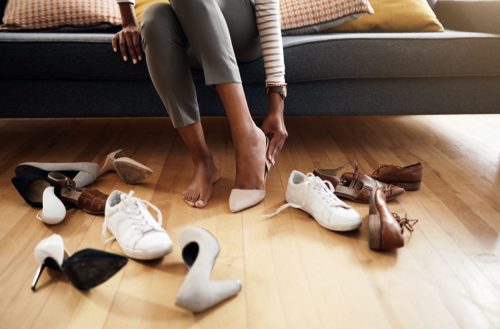
According to Brittany Steindl, PT, DPT, founder of BLS Physical Therapy, the footwear you choose actually affects your “overall body alignment and biomechanics.”
“The importance of shoe choice for those with back pain cannot be overstated. The right footwear supports proper alignment, distributes weight evenly, absorbs shock, and enhances muscle function, all of which contribute to reducing back pain,” Steindl explains.
Even worse, if you’re not wearing supportive shoes, you might be more susceptible to compensatory (secondary) injuries.
“Without adequate support, compensatory movements and postures can develop, leading to pain and impairments up the chain,” Steindl warns. “By ensuring that our feet are well-supported, we can help reduce the risk of back pain and other related issues.”
Wondering which pairs of shoes you may need to retire? Steindl and her fellow experts have you covered.
1
Flip-flops
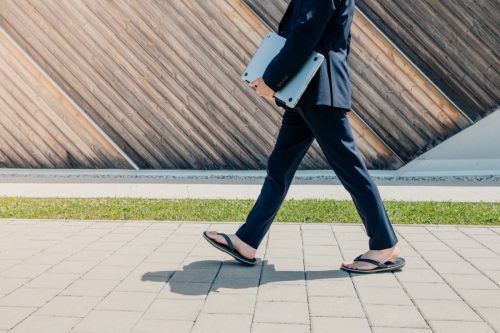
This one may seem obvious, but flip-flops aren’t recommended if you have back pain.
“These do not offer enough cushioning and shock absorption. Your standard flip-flop may seem cushioned, but it is not thick enough to absorb the shock of each step,” says Michael Fishkin, C.Ped, certified pedorthist for Northern Illinois Foot & Ankle Specialists.
He adds, “A lot of the time, to keep these shoes on when walking, you have to grip your toes, which creates a calf muscle contraction that creates tightness.”
2
Crocs and slides
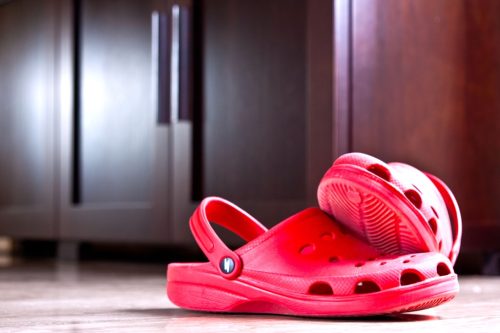
According to Suzi Schulman, DC, a chiropractor with Clifton Chiros, slides and Crocs may end up doing more harm than good if you have back pain.
“These shoes provide little to no support,” Schulman says in a May 31 TikTok video. “Look at yourself in the mirror once you put them on, and you’ll notice that your feet drop in, your knees come together. The support that’s supposed to be in your feet is now distributed to different joints in the body—and those joints will wear down quickly.”
RELATED: 7 Worst Shoes for Knee Pain, Podiatrists Say.
3
Flats
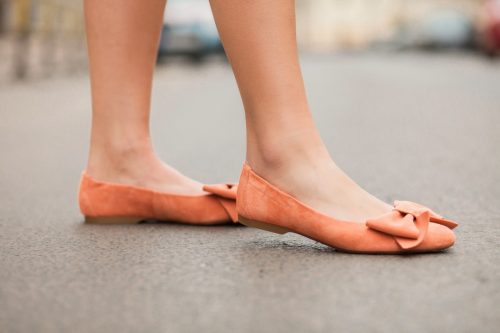
We’ve all seen trendy ballet flats on sale while out shopping, but if you have back pain, it might be best to leave these shoes in the 2000s.
“These types of shoes do not offer much in terms of shock absorption,” Fishkin points out. “As you walk and pound the ground, there are no reactive forces in the footwear to prevent the force from traveling up the leg to the thigh, affecting your back.”
4
High heels
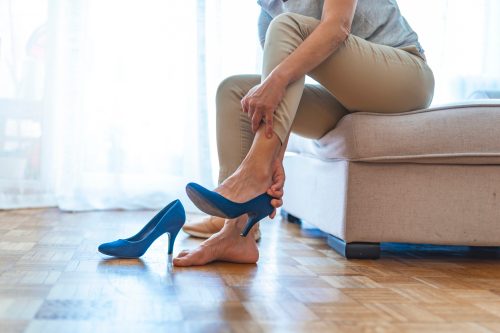
High heels can instantly boost your confidence and level up your outfit for work or a formal event. Tragically, however, they can also cause back pain.
“Anything over 2 inches can create a pelvic tip or tilt that can jam the lower back,” Fishkin warns.
RELATED: 5 Best Shoes for Flat Feet, Podiatrists Say.
5
Shoes with a narrow toe box
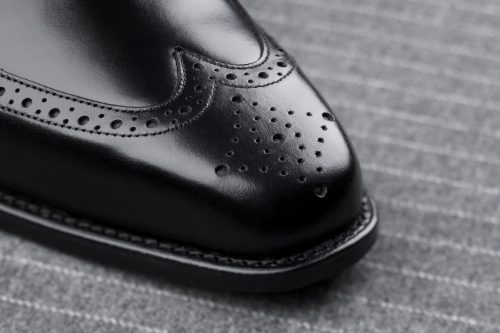
Consider the overall fit and feel of closed-toe shoes, but pay special attention to the toe box. If it’s too narrow—like in a pair of dress shoes or even running sneakers—it could send ripple effects through your back.
“[Shoes with narrow toeboxes] will squish the front of the toes together, causing not only neuromas, but they alter the way your foot hits the floor—again, just like before—distributing weight unevenly through other joints that need to compensate,” Schulman says on TikTok.
6
Certain flat sneakers
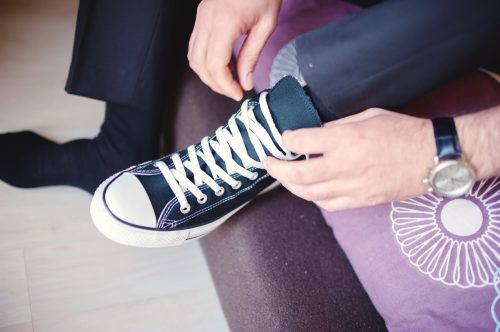
Certain flat sneakers, like Vans and Converse, could also exacerbate your back pain.
According to Bianca Carter, CEO of Feet First Clinic, these shoes offer minimal support.
“They’re super flat and offer no arch support and zero cushioning,” Carter says in an April 10 TikTok video. “This means there’s no shock absorption to protect your joints when you’re walking, which can be very bad for your back.”
7
Shoes that are too firm
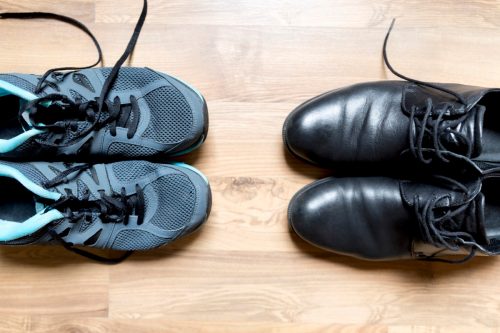
According to experts, just because a shoe is firmer, it doesn’t mean it’s more supportive. In fact, Fishkin cautions that you shouldn’t wear any shoes that feel too firm if you have back pain.
Shoes that feel too hard may lack cushioning, meaning they won’t be as effective with that all-important shock absorption factor. With that in mind, consider firmness if you’re very active or have a job that requires you to be on your feet.
“Good shoes provide shock absorption, reducing the impact on the spine and joints with each step,” Steindl explains. “This is especially important for people who spend a lot of time on their feet or engage in high-impact activities. Shoes with proper cushioning can help mitigate the repetitive impact that contributes to back pain.”